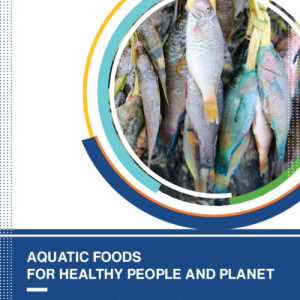
This report from WorldFish (an international organisation that researches aquatic systems, with a focus on sustainable development in low- and middle-income countries) sets out a research strategy for sustainable and equitable global aquatic food systems for the next decade. Aquatic foods include finfish, shellfish, aquatic plants and algae such as seaweed, aquatic products used as animal feed, and synthetic alternatives to aquatic products (e.g. from cellular agriculture).
The WorldFish research agenda focuses on three areas of impact: climate resilience and environmental sustainability; social and economic inclusion; and nutrition and public health. It maps the links between aquatic foods and the Sustainable Development Goals and the goals of One CGIAR (WorldFish is a member of the international CGIAR research partnership).
The report argues that aquatic foods could be a rich source of nutrients for the two billion people who currently suffer from deficiencies in macro- or micro-nutrients. It suggests that, with proper management and innovation, aquatic food systems could provide over six times as much food as they currently do. People who work in small-scale fisheries and small and medium aquaculture are the main focus of the report, since they are often marginalised or overlooked.
Read the full report here. See also the Table explainer What is food security?







Post a new comment »